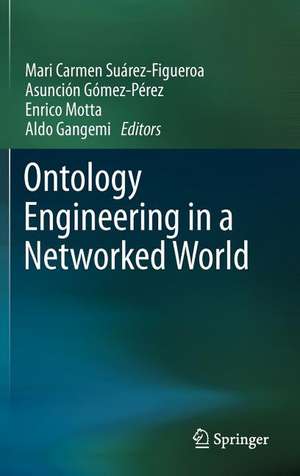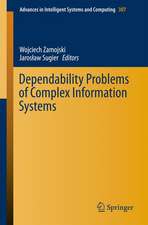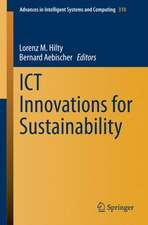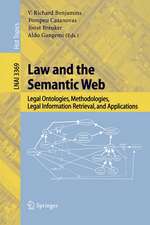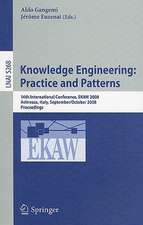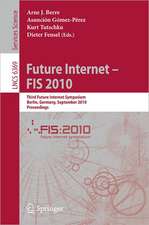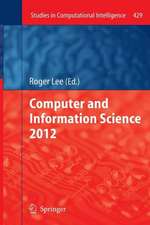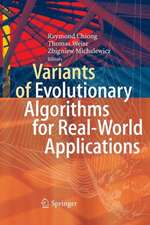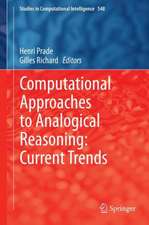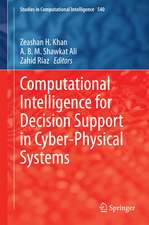Ontology Engineering in a Networked World
Editat de Mari Carmen Suárez-Figueroa, Asunción Gómez-Pérez, Enrico Motta, Aldo Gangemien Limba Engleză Hardback – 26 mar 2012
This book by Suárez-Figueroa et al. provides the necessary methodological and technological support for the development and use of ontology networks, which ontology developers need in this distributed environment. After an introduction, in its second part the authors describe the NeOn Methodology framework. The book’s third part details the key activities relevant to the ontology engineering life cycle. For each activity, a general introduction, methodological guidelines, and practical examples are provided. The fourth part then presents a detailed overview of the NeOn Toolkit and its plug-ins. Lastly, case studies from the pharmaceutical and the fishery domain round out the work.
The book primarily addresses two main audiences: students (and their lecturers) who need a textbook for advanced undergraduate or graduate courses on ontology engineering, and practitioners who need to develop ontologies in particular or Semantic Web-based applications in general. Its educational value is maximized by its structured approach to explaining guidelines and combining them with case studies and numerous examples. The description of the open source NeOn Toolkit provides an additional asset, as it allows readers to easily evaluate and apply the ideas presented.
| Toate formatele și edițiile | Preț | Express |
|---|---|---|
| Paperback (1) | 340.32 lei 6-8 săpt. | |
| Springer Berlin, Heidelberg – 17 apr 2014 | 340.32 lei 6-8 săpt. | |
| Hardback (1) | 346.75 lei 6-8 săpt. | |
| Springer Berlin, Heidelberg – 26 mar 2012 | 346.75 lei 6-8 săpt. |
Preț: 346.75 lei
Preț vechi: 433.44 lei
-20% Nou
Puncte Express: 520
Preț estimativ în valută:
66.35€ • 72.30$ • 55.91£
66.35€ • 72.30$ • 55.91£
Carte tipărită la comandă
Livrare economică 23 aprilie-07 mai
Preluare comenzi: 021 569.72.76
Specificații
ISBN-13: 9783642247934
ISBN-10: 3642247938
Pagini: 458
Ilustrații: XII, 444 p.
Dimensiuni: 155 x 235 x 30 mm
Greutate: 0.81 kg
Ediția:2012
Editura: Springer Berlin, Heidelberg
Colecția Springer
Locul publicării:Berlin, Heidelberg, Germany
ISBN-10: 3642247938
Pagini: 458
Ilustrații: XII, 444 p.
Dimensiuni: 155 x 235 x 30 mm
Greutate: 0.81 kg
Ediția:2012
Editura: Springer Berlin, Heidelberg
Colecția Springer
Locul publicării:Berlin, Heidelberg, Germany
Public țintă
Upper undergraduateCuprins
Introduction: Ontology Engineering in a Networked World.- The NeOn Methodology for Ontology Engineering.- Pattern-based Ontology Design.- The NeOn Ontology Models.- Ontology Requirements Specification.- Reusing and Re-engineering Non-ontological Resources for Building Ontologies.- Ontology Development by Reuse.- Ontology Localization.- Ontology (Network) Evaluation.- Modularizing Ontologies.- Ontology Evolution.- Methodological guidelines for matching ontologies.- Overview of the NeOn Toolkit.- Scheduling ontology engineering projects using gOntt.- Customizing your interaction with Kali-ma.- Visualizing and Navigating Ontologies with KC-Viz.- Reasoning with Networked Ontologies.- Knowledge management at FAO: a case study on network of ontologies in fisheries.- Electronic Invoice Management in the Pharmaceutical sector: The PharmaInnova case.- Integrating product information in the pharmaceutical sector.
Recenzii
"This book contributes to putting ontological engineering in a more realistic environment: out of the labs and into the real world (wide web), where reuse and inter-relationships are more the rule than exceptions." - from the foreword by Dr. V. Richard Benjamins
Notă biografică
Mari Carmen Suárez-Figueroa is a senior researcher at the Ontological Engineering Group (OEG) at Universidad Politécnica de Madrid (UPM), and also a teaching assistant of the Artificial Intelligence Department at the UPM’s Facultad de Informática. Her research activities include methodologies for ontology (network) development, ontology (network) development, ontology design patterns, ontology development tools, ontology evaluation, Linked Data and the Semantic Web. She has participated in different European and Spanish research projects and co-organized different workshops and tutorials in the ontology engineering field.
Asunción Gómez-Pérez is a full professor and Director of the Ontological Engineering Group (OEG) at the UPM, and also Director of the Artificial Intelligence Department at the UPM’s Facultad de Informática. Her main research areas are ontological engineering, Semantic Web and knowledge management. She has published more than 150 papers and is the author of two books in these fields. In addition, Asunción has been Co-Director of the International Summer School on Ontological Engineering and the Semantic Web since 2003.
Enrico Motta is professor of Knowledge Technologies at the Knowledge Media Institute (KMi) of The Open University in the UK. He is one of the leading scientists in Semantic Technologies and the author of more than 200 peer-reviewed publications. He has acted as an advisor to several national and international organizations for strategic research programs in a variety of countries, including the US, UK, Italy, the Netherlands, Austria, Estonia, Finland, and Switzerland, and he has also collaborated with several major organizations, including Nokia, Rolls Royce, Fiat, Philips, and the United Nations. Lastly, Enrico is founder and Director of the International Summer School on Ontology Engineering and the Semantic Web.
Aldo Gangemi is a senior researcher at the CNR Institute ofCognitive Sciences and Technology in Rome, and head of the Semantic Technology Lab, where he has worked in medical informatics, knowledge engineering, semantic technologies, and the Semantic Web. His research focuses on pattern-based ontology design, semantic social networks, hybridization of NLP, lexical and semantic resources, and meta-models for heterogeneous knowledge integration; he has published more than 100 articles in these areas. He has also coordinated the Working Group for the Standardization of Metadata and Semantics in the e-Services of the Italian Public Administration, and the W3C Task Force on Porting WordNet to the Semantic Web.
Asunción Gómez-Pérez is a full professor and Director of the Ontological Engineering Group (OEG) at the UPM, and also Director of the Artificial Intelligence Department at the UPM’s Facultad de Informática. Her main research areas are ontological engineering, Semantic Web and knowledge management. She has published more than 150 papers and is the author of two books in these fields. In addition, Asunción has been Co-Director of the International Summer School on Ontological Engineering and the Semantic Web since 2003.
Enrico Motta is professor of Knowledge Technologies at the Knowledge Media Institute (KMi) of The Open University in the UK. He is one of the leading scientists in Semantic Technologies and the author of more than 200 peer-reviewed publications. He has acted as an advisor to several national and international organizations for strategic research programs in a variety of countries, including the US, UK, Italy, the Netherlands, Austria, Estonia, Finland, and Switzerland, and he has also collaborated with several major organizations, including Nokia, Rolls Royce, Fiat, Philips, and the United Nations. Lastly, Enrico is founder and Director of the International Summer School on Ontology Engineering and the Semantic Web.
Aldo Gangemi is a senior researcher at the CNR Institute ofCognitive Sciences and Technology in Rome, and head of the Semantic Technology Lab, where he has worked in medical informatics, knowledge engineering, semantic technologies, and the Semantic Web. His research focuses on pattern-based ontology design, semantic social networks, hybridization of NLP, lexical and semantic resources, and meta-models for heterogeneous knowledge integration; he has published more than 100 articles in these areas. He has also coordinated the Working Group for the Standardization of Metadata and Semantics in the e-Services of the Italian Public Administration, and the W3C Task Force on Porting WordNet to the Semantic Web.
Textul de pe ultima copertă
The Semantic Web is characterized by the existence of a very large number of distributed semantic resources, which together define a network of ontologies. These ontologies in turn are interlinked through a variety of different meta-relationships such as versioning, inclusion, and many more. This scenario is radically different from the relatively narrow contexts in which ontologies have been traditionally developed and applied, and thus calls for new methods and tools to effectively support the development of novel network-oriented semantic applications.
This book by Suárez-Figueroa et al. provides the necessary methodological and technological support for the development and use of ontology networks, which ontology developers need in this distributed environment. After an introduction, in its second part the authors describe the NeOn Methodology framework. The book’s third part details the key activities relevant to the ontology engineering life cycle. For each activity, a general introduction, methodological guidelines, and practical examples are provided. The fourth part then presents a detailed overview of the NeOn Toolkit and its plug-ins. Lastly, case studies from the pharmaceutical and the fishery domain round out the work.
The book primarily addresses two main audiences: students (and their lecturers) who need a textbook for advanced undergraduate or graduate courses on ontology engineering, and practitioners who need to develop ontologies in particular or Semantic Web-based applications in general. Its educational value is maximized by its structured approach to explaining guidelines and combining them with case studies and numerous examples. The description of the open source NeOn Toolkit provides an additional asset, as it allows readers to easily evaluate and apply the ideas presented.
This book by Suárez-Figueroa et al. provides the necessary methodological and technological support for the development and use of ontology networks, which ontology developers need in this distributed environment. After an introduction, in its second part the authors describe the NeOn Methodology framework. The book’s third part details the key activities relevant to the ontology engineering life cycle. For each activity, a general introduction, methodological guidelines, and practical examples are provided. The fourth part then presents a detailed overview of the NeOn Toolkit and its plug-ins. Lastly, case studies from the pharmaceutical and the fishery domain round out the work.
The book primarily addresses two main audiences: students (and their lecturers) who need a textbook for advanced undergraduate or graduate courses on ontology engineering, and practitioners who need to develop ontologies in particular or Semantic Web-based applications in general. Its educational value is maximized by its structured approach to explaining guidelines and combining them with case studies and numerous examples. The description of the open source NeOn Toolkit provides an additional asset, as it allows readers to easily evaluate and apply the ideas presented.
Caracteristici
Provides structured guidelines for Semantic Web application development and ontology engineering Combines sound methodologies with numerous examples and real-world case studies Allows readers to easily evaluate and apply methodologies through the open source NeOn toolkit Serves as a textbook for graduate courses as well as a state-of-the-art overview and guide for practitioners Includes supplementary material: sn.pub/extras
